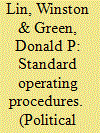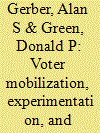| Srl | Item |
| 1 |
ID:
105174


|
|
|
|
|
| Publication |
2011.
|
| Summary/Abstract |
We report the results of the first large-scale experiment involving paid political advertising. During the opening months of a 2006 gubernatorial campaign, approximately $2 million of television and radio advertising on behalf of the incumbent candidate was deployed experimentally. In each experimental media market, the launch date and volume of television advertising were randomly assigned. In order to gauge movement in public opinion, a tracking poll conducted brief telephone interviews with approximately 1,000 registered voters each day and a brief follow-up one month after the conclusion of the television campaign. Results indicate that televised ads have strong but short-lived effects on voting preferences. The ephemeral nature of these effects is more consistent with psychological models of priming than with models of on-line processing.
|
|
|
|
|
|
|
|
|
|
|
|
|
|
|
|
| 2 |
ID:
146598


|
|
|
|
|
| Summary/Abstract |
Across the social sciences, growing concerns about research transparency have led to calls for pre-analysis plans (PAPs) that specify in advance how researchers intend to analyze the data they are about to gather. PAPs promote transparency and credibility by helping readers distinguish between exploratory and confirmatory analyses. However, PAPs are time-consuming to write and may fail to anticipate contingencies that arise in the course of data collection. This article proposes the use of “standard operating procedures” (SOPs)—default practices to guide decisions when issues arise that were not anticipated in the PAP. We offer an example of an SOP that can be adapted by other researchers seeking a safety net to support their PAPs.
|
|
|
|
|
|
|
|
|
|
|
|
|
|
|
|
| 3 |
ID:
149370


|
|
|
|
|
| Summary/Abstract |
Field experiments on voter mobilization enable researchers to test theoretical propositions while at the same time addressing practical questions that confront campaigns. This confluence of interests has led to increasing collaboration between researchers and campaign organizations, which in turn has produced a rapid accumulation of experiments on voting. This new evidence base makes possible translational works such as Get Out the Vote: How to Increase Voter Turnout that synthesize the burgeoning research literature and convey its conclusions to campaign practitioners. However, as political groups develop their own in-house capacity to conduct experiments whose results remain proprietary and may be reported selectively, the accumulation of an unbiased, public knowledge base is threatened. We discuss these challenges and the ways in which research that focuses on practical concerns may nonetheless speak to enduring theoretical questions.
|
|
|
|
|
|
|
|
|
|
|
|
|
|
|
|